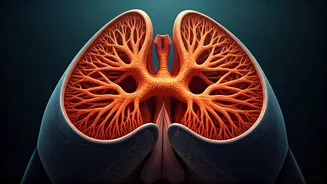Whales' Cancer Puzzle
Whales, among the largest and longest-living mammals, should logically be riddled with cancer. Given their size and lifespan, the probability of cancer developing
is exceptionally high. However, studies show that whale populations exhibit lower-than-expected cancer rates. This discrepancy presents a captivating scientific enigma. Scientists and researchers are thus drawn to understand the mechanisms that allow whales to resist this illness. Research focuses on analyzing whale physiology, genetics, and environmental factors to unravel this phenomenon, hoping to discover solutions applicable to human health. This research area is expanding and has the potential to revolutionize cancer treatments and prevention strategies. Understanding the ways whales protect themselves provides critical insights into fighting cancer in humans.
Cellular Defense Strategies
One key area of research revolves around the whale's cellular defense mechanisms. Whales have developed several sophisticated ways of protecting their cells from damage. One mechanism is related to the unique structure of whale DNA. Scientists are studying whether whales have a higher number of tumor suppressor genes. These genes are the cellular bodyguards, which identify and eliminate damaged cells before they become cancerous. It appears that whales might have more of these vital genes than other mammals, increasing their ability to eliminate cancerous cells. Furthermore, scientists are exploring the possibility that whales have developed more effective DNA repair systems. These systems are responsible for correcting errors in the genetic code, preventing mutations that can lead to cancer. The whale's robust defense systems provide clues that could be used to create improved cancer treatments and prevention methods.
Environmental Influences
Environmental factors also contribute to the whale's cancer resistance. Whales live in diverse aquatic environments, and exposure to environmental toxins is unavoidable. But they have developed ways to minimize the impact of these toxins. Scientists investigate how whales detoxify harmful substances, such as pollutants and heavy metals. Some research proposes that whale tissues have developed advanced detoxification processes that neutralize or eliminate toxins before they can cause cellular damage. Additionally, their diet may affect their defense against cancer. Whales have unique diets that involve specific nutritional compounds. Analyzing their diets and understanding how these compounds support their immune function is another key area of study. Understanding environmental factors and whale's dietary habits enhances the overall picture of their resilience to cancer and sheds light on potential approaches for human health.
Genetics and Cancer
The genetic makeup of whales holds essential clues to their cancer resistance. Comparing the genomes of whales with those of other mammals, including humans, offers crucial insights. Scientists search for unique genes or genetic variations that are common in whales but absent or less prevalent in species with a high cancer incidence. This study focuses on identifying genes associated with tumor suppression, DNA repair, and immune system regulation. It explores if specific genetic traits give whales cancer resistance. For example, some whale species have multiple copies of certain genes associated with cancer resistance. Analyzing these genetic differences may lead to new diagnostic techniques and treatments for cancer in humans. Researchers can use techniques like gene editing or drug development to mimic the protective traits found in whales, offering innovative strategies for fighting this disease.
Future Research Directions
Future research will likely focus on several avenues, including advanced imaging, proteomics, and computational biology. Advanced imaging technologies will help scientists to analyze whale tissues and track cancer cells. Proteomics, the study of proteins, allows scientists to understand the molecular mechanisms that contribute to cancer resistance. By analyzing the proteins in whale cells, researchers can identify the key protective elements. Furthermore, computational biology will play an increasingly vital role. Scientists can utilize these technologies to build sophisticated models of whale biology, helping understand how various factors interact and affect cancer development. Collaborative research across diverse disciplines, including genetics, marine biology, and oncology, is key to success. Future efforts will continue to yield insights into how whales naturally combat cancer, ultimately bringing better treatment options for humans.




















